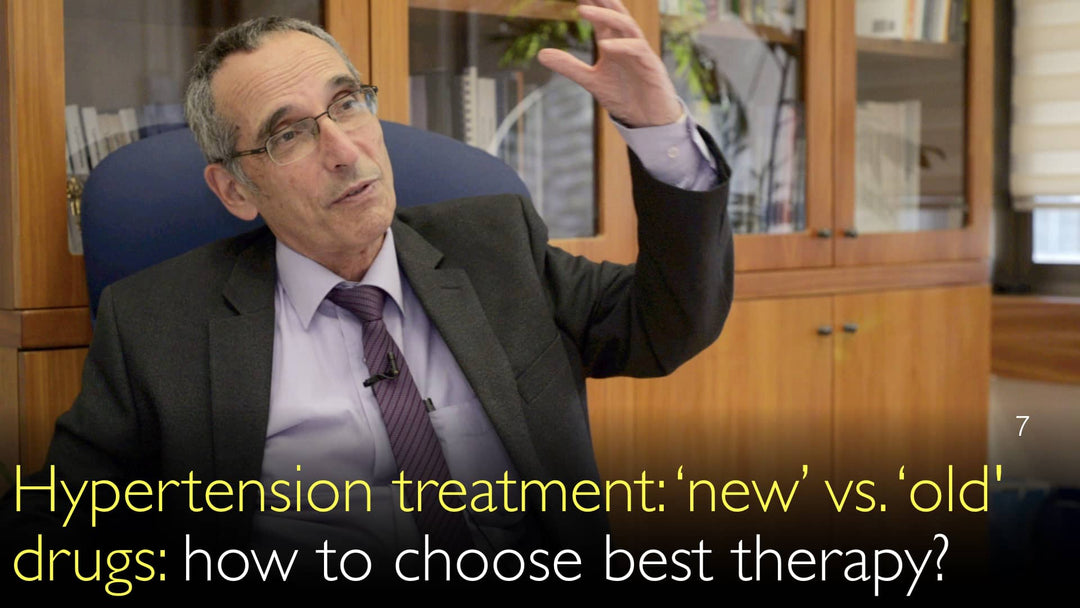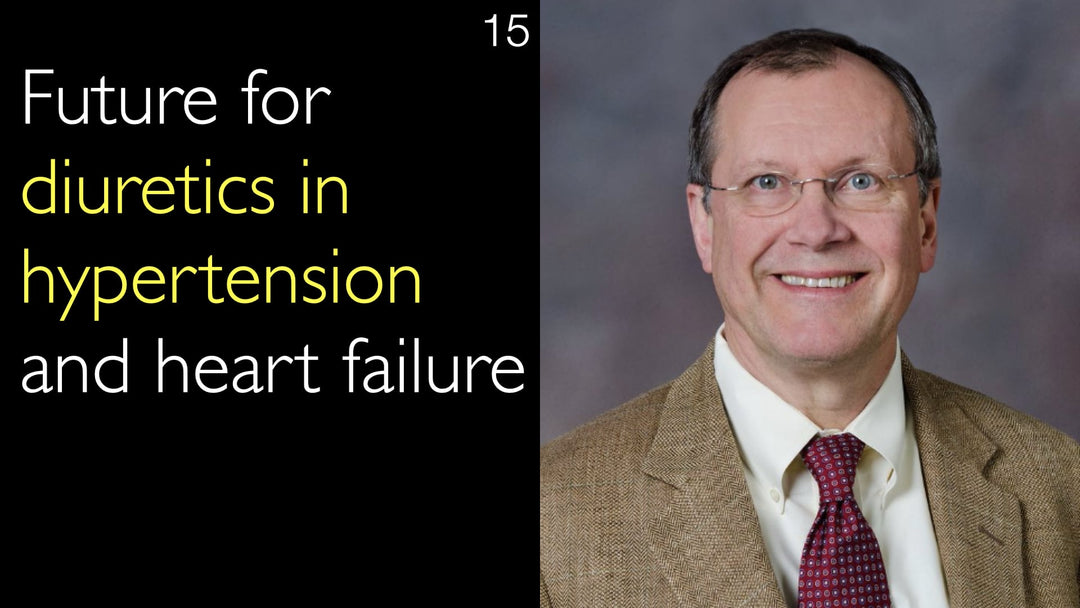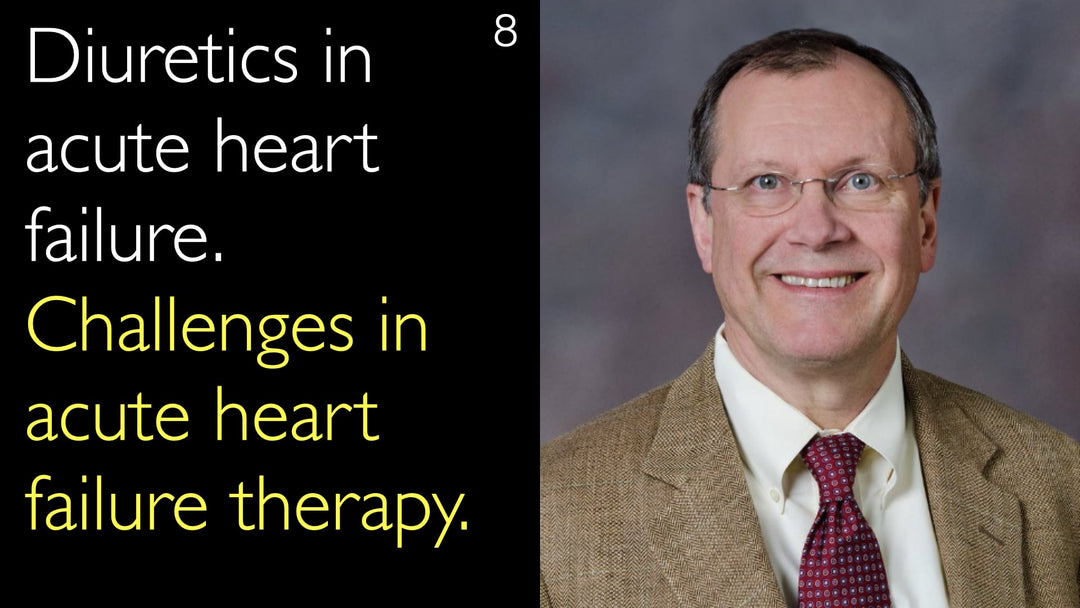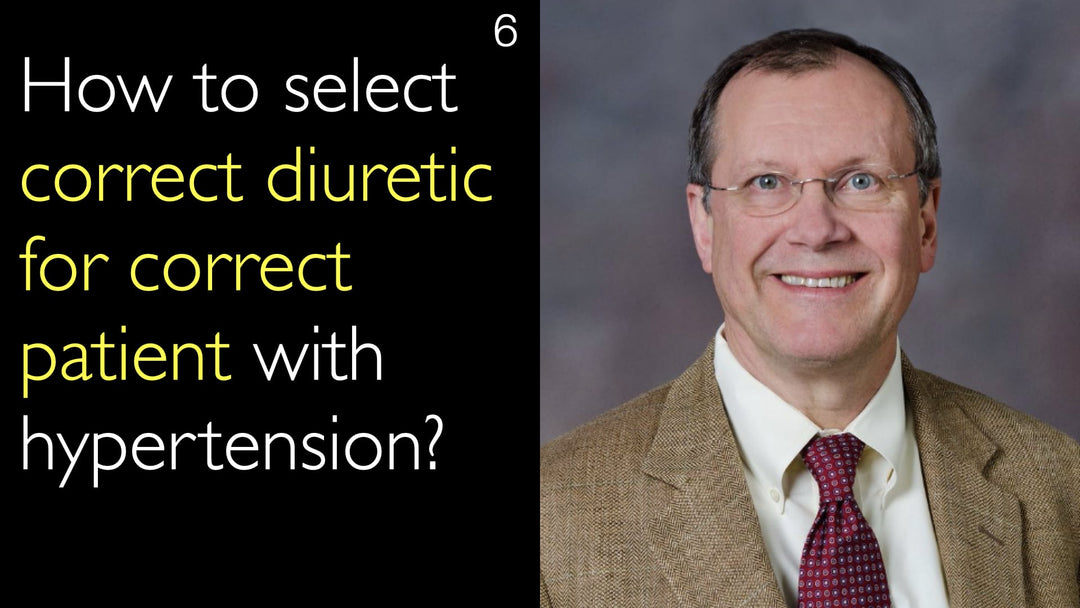Leading expert in hypertension treatment, Dr. Ehud Grossman, MD, explains the evolution of high blood pressure therapy. He details the shift from older beta-blocker and diuretic combinations to modern ACE inhibitor and calcium channel blocker regimens. Dr. Ehud Grossman, MD, discusses the optimal drug combinations for achieving blood pressure targets and preventing heart attacks and strokes. He also addresses current treatment controversies, including blood pressure goals and the role of specific diuretics like indapamide.
Optimal Hypertension Treatment: Modern Drug Combinations and Therapy Choices
Jump To Section
- Modern Hypertension Treatment Foundations
- Best Drug Combinations for Blood Pressure Control
- Role of Diuretics in Hypertension Management
- Beta-Blockers in Contemporary Hypertension Care
- Current Controversies in Hypertension Therapy
- Full Transcript
Modern Hypertension Treatment Foundations
Hypertension treatment requires complex pharmacological decisions. Dr. Ehud Grossman, MD, explains that therapy often involves multiple medication combinations. The landscape of antihypertensive drugs has evolved significantly from older cornerstone therapies.
Dr. Grossman clarifies that what were once considered "new drugs" are now established treatments. The foundational shift moved away from beta-blockers and diuretics as first-line options. Modern hypertension management now prioritizes different drug classes for superior outcomes.
Best Drug Combinations for Blood Pressure Control
The optimal combination for hypertension treatment involves ACE inhibitors or angiotensin receptor blockers with calcium channel blockers. Dr. Ehud Grossman, MD, emphasizes this regimen provides the best blood pressure control. This combination effectively achieves target blood pressure levels while preventing end-organ damage.
Dr. Anton Titov, MD, discusses with Dr. Grossman how this approach reduces cardiovascular events like heart attacks and strokes. The fixed-dose combination of these medications represents current best practice in hypertension management. This strategy forms the cornerstone of modern antihypertensive therapy.
Role of Diuretics in Hypertension Management
Diuretics serve as the third medication added when initial combination therapy proves insufficient. Dr. Ehud Grossman, MD, specifically recommends indapamide over hydrochlorothiazide based on clinical evidence. Studies show indapamide provides superior benefits for hypertension control, especially in elderly patients.
Dr. Ehud Grossman, MD, notes that while most positive diuretic studies used chlorthalidone, hydrochlorothiazide has demonstrated failures in some trials. The preference for indapamide stems from its proven effectiveness in achieving blood pressure targets. This diuretic choice represents an important nuance in modern hypertension treatment protocols.
Beta-Blockers in Contemporary Hypertension Care
Beta-blockers have significantly declined in popularity as first-line hypertension treatment. Dr. Ehud Grossman, MD, explains these medications provide less cardiovascular protection compared to newer alternatives. The reasons for this reduced efficacy, particularly in elderly patients, remain incompletely understood.
Dr. Grossman clarifies that beta-blockers now serve specific indications rather than general hypertension management. These include post-myocardial infarction care and tachyarrhythmia treatment. The medication carries more potential side effects with less benefit for elderly hypertensive patients, making it unsuitable for routine use.
Current Controversies in Hypertension Therapy
Several important controversies persist in hypertension treatment despite advances in therapy. Dr. Ehud Grossman, MD, identifies blood pressure targets as the primary ongoing debate. The conflict between 130/80 mmHg versus 140/90 mmHg targets remains unresolved in some clinical circles.
Additional controversies include the optimal first drug choice and the extent of evaluation for secondary hypertension causes. Dr. Anton Titov, MD, and Dr. Grossman discuss whether genetic consultation should be part of hypertension workups. While these controversies have diminished, they continue to influence clinical decision-making in complex cases.
Full Transcript
Dr. Ehud Grossman, MD: If we move to pharmacological therapy of hypertension, treatment of hypertension is quite complex. It often requires a combination of medications. There is a broad concept of "old drugs" for hypertension, then there are "new drugs," also used in combination.
There are some reviews in the literature, and you co-authored one of the reviews which discusses relative merits and pros and cons of new hypertension drug combinations vs. old hypertension drug combinations.
In the last few years, unfortunately, the last 5–6 years, we don't have new drugs to treat hypertension. The "new drugs" now are also "old drugs" for hypertension treatment. In the past, we used more beta-blockers and diuretics. These were the basic cornerstones of hypertension treatment.
Then we had the ACE inhibitors and angiotensin receptor blockers (ARBs) and calcium channel blockers (CCBs). Now we know that the combination of ACE inhibitor or angiotensin receptor blocker with the calcium channel blocker is the best combination to get targeted blood pressure, and also to prevent end organ damage and events like heart attacks and strokes.
Then the third drug is the diuretic that we add to the combination of hypertension treatment. Beta-blocker was one of the lead drugs in the past to treat high blood pressure. Beta-blockers are now less popular, and we know today that it protects the cardiovascular system less. We don't know exactly why, but these are the facts.
Beta-blockers are less efficient, especially in the elderly. That's why we keep the beta blocker for certain cases or when there is an indication to give a beta blocker—like after myocardial infarction and tachyarrhythmia. Of course, in the elderly, beta-blockers would carry more potential side effects.
Yes, more side effects and less benefit. So in the elderly, definitely, we would go to diuretic, ACE inhibitor, and calcium channel blockers.
Among diuretics, there are also some relatively new drugs like indapamide. Yes, and it's amazing because most of the positive studies with diuretics were done with chlorthalidone. But in practice now, you mostly use hydrochlorothiazide, and some studies with hydrochlorothiazide failed, which means hydrochlorothiazide was less beneficial than the calcium antagonist.
There is another drug in Israel, indapamide, and there is data about the benefit of indapamide, especially in the elderly. So I prefer today to use a fixed-dose combination of ACE inhibitor or angiotensin receptor blocker and calcium antagonist to treat hypertension.
If the patient does not reach the blood pressure goal with this combination, I add diuretic. Since the diuretic is not part of the fixed-dose combination, we use today indapamide, because indapamide in several studies showed very positive effect on hypertension, and despite the fact that it is very similar to hydrochlorothiazide, it is much better.
There are also some fixed-dose combinations of ACE inhibitors with indapamide. Yes, but not in Israel. If you have a combination of ACE inhibitor and indapamide, and you on top of it use a calcium antagonist, or you have an option of ACE inhibitor and calcium antagonist and then on top of it add diuretic indapamide.
Dr. Anton Titov, MD: Hypertension treatment, as we've already discussed, requires complex decisions about the therapy, but nevertheless there are some controversies and some particular nuances of hypertension treatment. Could you discuss controversies in hypertension treatment?
Dr. Ehud Grossman, MD: The controversy is mainly what should be the target of blood pressure in hypertension treatment, and especially in the elderly, and which drug should be the first drug of choice in treatment of hypertension, and how deep you have to evaluate the patient for secondary causes of hypertension.
Whether you need to do a genetic consultation in hypertension, etc. I mean, there are controversies, but today they are less controversial.
We still have a controversy about optimal blood pressure target—whether it should be 130/80 or 140/90? When to define someone as hypertensive? And whether to use the beta-blocker or not use the beta blocker here, whether to start with ACE inhibitor or not? Not too many hypertension therapy controversies, but we have some.







